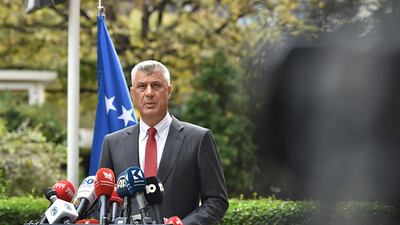Kosovo President Hashim Thaci resigned on Thursday after it was revealed he is to face a war crimes court in The Hague.
The 52-year-old said he would step down prior to his appearance in court to "protect the integrity" of the office of the president.
He has been charged with war crimes dating back to the conflict with Serbia in the 1990s, when Mr Thaci was the political chief of Kosovo's rebel army.
"I will not allow under any circumstances that I appear before court as the president of the Republic of Kosovo," he said.
"Therefore, in order to protect the integrity of the office of the president and the country, as well as the dignity of the citizens, I resign from the position of president of the Republic of Kosovo."
Mr Thaci was indicted by a special Kosovo court based in The Hague, Netherlands, which was set up to try the alleged crimes of former ethnic Albanian rebel leaders.
He has long insisted on his innocence in a war that many people in Kosovo, which is home mainly to ethnic Albanians, considered a just struggle for their independence from Serbian oppression.
"These are not easy moments for me and my family, and for those who have supported and believed in me in the past three decades of our struggle for freedom, independence and nation-building," Mr Thaci said.
In June, prosecutors charged him with 10 offences, including murder, enforced disappearance of people, persecution and torture.
Mr Thaci did not say which specific charges had been confirmed and prosecutors declined to comment.
Set up with EU-backing in 2015, the Kosovo Specialist Chambers operates under Kosovo law but is based in The Hague to protect witnesses from intimidation in a society where many former rebel commanders still dominate politics.
Mr Thaci is one of several politicians who have been indicted for war crimes.
Among them is former parliament speaker Kadri Veseli, who said that he has been issued an indictment by a pre-trial judge and that he planned to travel to the Hague on Thursday.
Three other former commanders of the Kosovo Liberation Army that fought for independence from Serbia have been charged with war crimes by the court.
Announcing the indictment, the Specialist Prosecutor’s Office alleged that Mr Thaci and others were “criminally responsible for nearly 100 murders”.
At the time, the prosecutor's office said it made the existence of the indictment public because of what it called repeated efforts by Mr Thaci and Mr Veseli “to obstruct and undermine” the work of the court, and said they were believed to have tried to overturn the Kosovo law that created the court.
The formation of the court and prosecutor's office followed a 2011 report by the Council of Europe, a human rights body, that included allegations that KLA fighters trafficked human organs taken from prisoners and killed Serbs and fellow ethnic Albanians.
The court is mandated to investigate and prosecute allegations of war crimes and crimes against humanity in Kosovo, or linked to the Kosovo conflict, from 1998-2000.
The 1998-1999 war for independence from Serbia ended after a 78-day Nato air campaign against Serbian troops.
Kosovo declared its independence from Serbia in 2008.


